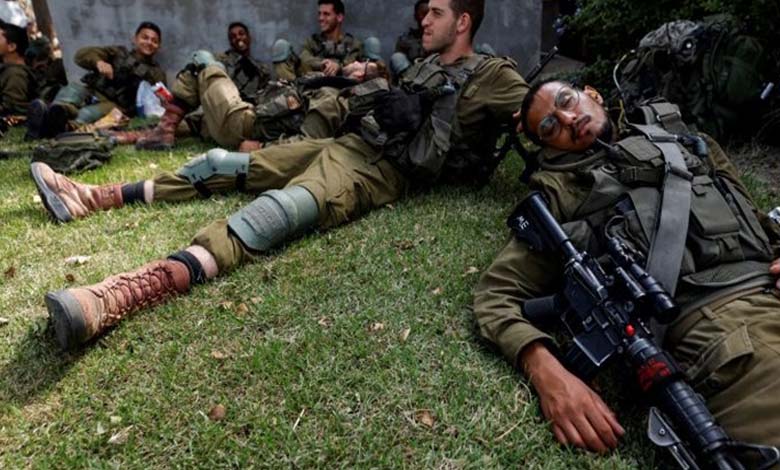“Theft, Arson, and No Justification”.. Israeli Soldiers Refuse to Return to Gaza

Three Israeli reserve soldiers revealed in an interview with The Observer magazine their reasons for refusing to return to war in Gaza.
Israeli military medic Yuval Green said that the order to burn a house was the reason behind his decision to end his reserve service. Green had spent 50 days in the city of Khan Younis in the southern Gaza Strip earlier this year with his paratrooper unit, where he slept in a house lit only by battery-operated lights amidst the rubble and destruction.
He began to question the unit’s purpose there months ago when he heard about Israel’s refusal to agree to Hamas’ demands to end the war and release hostages.
Green is one of three Israeli reserve soldiers who expressed in an interview with The Observer magazine their refusal to return to military service in Gaza if called upon. The three had completed their mandatory military service in the Israeli army, which forms the backbone of society.
They returned to Gaza after the October 7 attack, which killed about 1,200 people in the towns and settlements surrounding Gaza and led to the taking of about 250 people as hostages.
Destructive Behavior
But the “destructive behavior” Green witnessed from other soldiers only fueled the fears he had when going to Gaza, where he was disheartened by what he described as a “cycle of violence.”
He said he stayed there out of a sense of duty to care for his unit members, whom he had known from his years of mandatory military service, adding that they were angry after seeing the destruction caused by Hamas’ attacks on Israeli cities.
Green said: “I saw soldiers breaking into houses or stealing all the time. They entered houses for military reasons, searching for weapons, but it was more fun when they were looking for souvenirs – they were particularly fond of necklaces with Arabic inscriptions and would collect them.”
He added: “Earlier this year, we received an order. We were inside a house, and our commander ordered us to burn it.”
When he discussed the matter with his company commander: “The answers he gave me were not convincing. I said: if we are doing all this for no reason, I will not participate. And I left the next day.”
Two of the reservists said they might feel compelled to return to service if the exchange of drone strikes, air raids, and artillery fire between Israel and Hezbollah in Lebanon turned into a full-scale war.
The three cite various motivations behind their decision not to serve in Gaza again, ranging from the way the army conducts the war to the government’s reluctance to agree to a hostage deal, which would end the fighting.
It is worth noting that 41 reservists signed an open letter last month announcing their refusal to continue the Israeli army‘s operation in the city of Rafah in the southern Gaza Strip.
The soldiers wrote: “The half year we participated in the war effort proved to us that military action alone will not bring the hostages home. Every passing day puts the lives of the hostages and soldiers still in Gaza at risk and does not restore security to the residents of Gaza and the northern border.”
Civic education teacher Tal Vardi, who trained reservists to drive tanks in northern Israel during his last return to the army, said: “Any sane person can see that the military presence does not help in bringing the hostages back.”
He continued: “So, if we can’t get the hostages back, all that happens is causing more death on our side or the Palestinian side… I can no longer justify this military operation. I am unwilling to be part of an army that does this.”
He indicated that “some of these operations put the hostages at risk, and the army mistakenly killed some of them,” referring to an incident last December when Israeli forces shot at three hostages in Gaza who approached them waving white flags, which the Israeli army described as a case of mistaken identity.
-
Israeli Officer Under Fire for Secretly Filming Naked Recruits
-
“I Feel Ashamed”… First Resignation in the U.S. Army Due to Gaza War
Reserve soldier Michael Ofer Ziv said the incident gave him a strong feeling that once his military service on the Gaza border ended, he would not return. For him, the incident symbolizes a general lack of care, and he was concerned about the system in which such mistakes can happen.
Ziv said that the decision to invade Rafah instead of concluding a hostage deal led him to decide not to return to the army. He said that when he was recently asked to do so, he informed his commander that he could not return.
-
Dangerous Escalation: Hezbollah Targets Israeli Fighter Jets for the First Time Since the War Began
-
Washington denies using floating dock in rescue of Israeli hostages and announces completion of aid deliveries
He added: “I came after October 7 because I felt they were worth it and were using us in a way that could be beneficial. But I am not willing to participate in this because I do not trust the government and what they are trying to do.”
He added: “If anything happens in the north, there is a chance I will go, but on the other hand, I know what it will be like. I know what we did in Gaza – and there is nothing to make us think we will act differently in Lebanon.”












